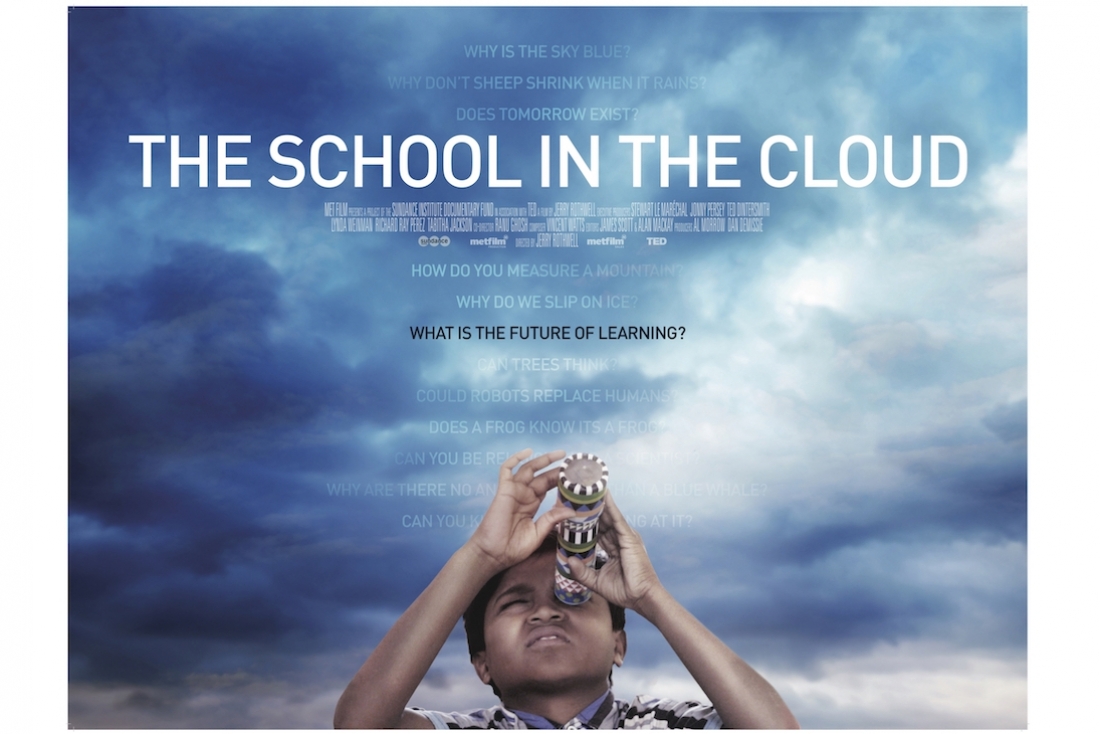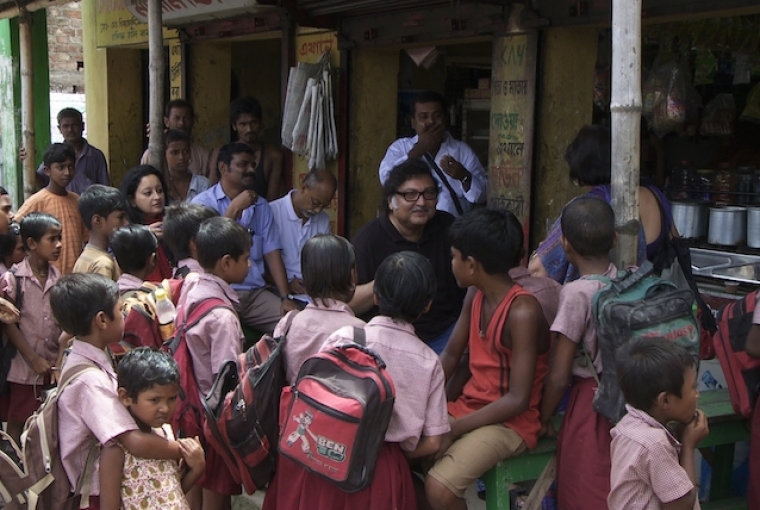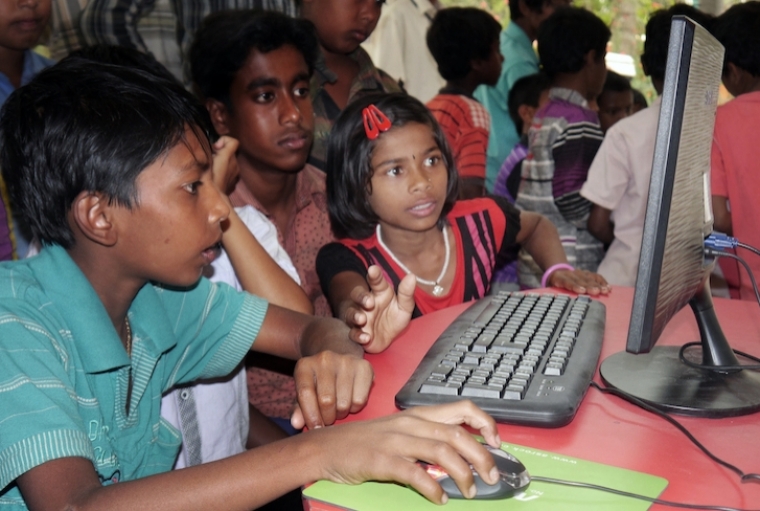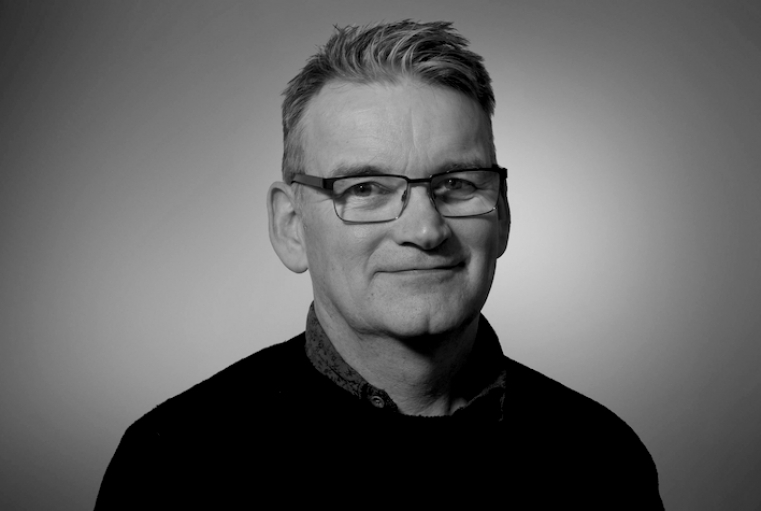

What is the future of education in a networked world? Indian professor Sugata Mitra calls for a revolution in how and what we learn. With a global network of information a few clicks away, Mitra argues that the Victorian model on which our school systems are based is obsolete. Building on this research and on viral TED talks he gave about in 2010 and 2013, Mitra embarked on a much more advanced experiment by installing standalone, unmanned physical labs in locations ranging from rural West Bengal to Gateshead in the UK. The School In The Cloud, a feature documentary by Jerry Rothwell, presented by Met Film Production, follows this three year experiment by Mitra. Rothwell’s film explores the impact of Sugata’s work, predominantly through the experience of children in the remote Indian village of Korakati in the Ganges Delta and raises significant questions about our current education models, the impact of technology in education and the resulting conflict between tradition and modernity.
We connected with Jerry Rothwell to know more about him and the documentary. Excerpts follow:
Please tell us a little bit about yourself and what led you towards filmmaking?
I’m a UK based filmmaker, making documentaries about a wide range of subjects - from the founders of Greenpeace in 'How To Change The World’, to a sperm donor and his many children in ’Donor Unknown’, from Ethiopian athletes in ‘Town Of Runners’ to a wine fraud in ‘Sour Grapes’. Apart from an early fascination with my dad’s super 8 camera, I think what drew me into filmmaking was its rich potential to explore peoples stories in ways that can allow an audience to step into the shoes of others for a short while. There’s something very powerful about the potential of cinema to tell a story both subjectively (through the dreamy magic of sounds and images) and objectively (by showing the forces at work in the wider external world) at the same time.

Sugata Mitra with children
How would you define your filmmaking sensibility and which filmmakers or movies have influenced it?
I hope to discover and reveal the extraordinary in the everyday. That leads less to a fly-on-the-wall style and more to one that, whilst rooted in actuality, tries to find the meanings that are under the surface in the things we see and hear. For me, a film is about creating a contained world, a story world, which provokes people to explore and think about ideas, in which they can elate other peoples situation to their own. A good film speaks to us emotionally - but I think also points us to think about how we can take action in the world. Some of the documentary makers whose work are love include Errol Morris, Kim Longinotto, Josh Oppenheimer, Sarah Polley, Molly Dineen, Nicholas Philibert, Michael Glawogger, Kazuo Hara
How were you led towards Sugata Mitra’s story and what made you want to make a documentary on it?
Like many people, I first encountered Sugata’s ideas through his Ted Talks - beautifully crafted short expositions of his thinking. I liked the fusion of ideas about child centred education with the potential of technology and the internet. His thoughts about how the extent of the knowledge we can access at the click of a mouse should change how we educate our children, felt urgently important. When Sugata won the TED Prize to do a three year experiment implementing his ideas, TED joined with the Sundance Institute to offer an award to a filmmaker to follow the project. I was interested in the chance to see how those ideas, some of improbably provocative, would work in practice. So I put in an application and was lucky enough to be even the award. My producers and I then raised additional money to turn that short into a feature documentary.

Film Still
Can you take us behind your creative process of making this documentary?
We knew that we wanted as far as possible for an audience to see the evolution of the 'Schools In The Cloud' through the eyes of the children - and to do that over as much time as possible (we filmed over a period of 3 years in the different locations). In the case of the children in Korakati in the Sunderbans, they were also encountering the internet for the first time, so we also wanted to document the impact of that on both them and their families. The second important strand was to show the evolution of Sugata’s ideas, from hole-in-the-wall computers twenty years ago, to online mentoring through the ‘granny cloud’ to inquiry based learning in stand-alone buildings where activities are largely self-organised by children. We just tried to stay open to what might happen and how those aspects of Sugata’s project would unfold - their strengths and their challenges. We weren’t making a promotional film, but one that really tried to understand the realities of the project.
What kind of challenges did you face while making this documentary?
One of the more difficult aspects of making the film was that, necessarily, the things that we wanted to capture on film unfolded over a long time - children growing up, showing learning, developing ideas and skills. So when filming in a relatively remote place like Korakati, it was difficult to know how to time our visits to the 'School in the Cloud' there to make sure we captured key moments. I worked with Kolkata-based filmmaker Ranu Ghosh who also shot substantial sections of the Indian material in the film and developed strong relationships with the children and their families.

Jerry Rothwell
What has been your experience been like at the film festivals the documentary has travelled to and what do you hope the viewers take away from this documentary?
The film always sparks in-depth conversations about education - about the state of education in whichever country we’re screening, and about the potential for changing it. 'Schools In The Cloud' aren’t a solution on their own, but they do perhaps point the direction to a different way of thinking about education, and one which is badly needed.
Lastly, what’s next for you?
I’m currently working on a film about non-speaking autistic young people, based on Naoki Higashida’s book ‘The Reason I Jump’, which should be released early next year.
Text Nidhi Verma